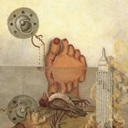0258 Wading into Battle: Frida Kahlo, Surrealism, and the Gradivian Myth
Identifiers (Article)
Abstract
The author investigates Frida Kahlo’s subversive response to the surrealist imaginary of the Woman-Child, brought to life in Wilhelm Jensen’s novella Gradiva (1901). The author retraces the Freudian roots of Gradiva’s popularity among the surrealists, and analyses Kahlo’s painting What the Water Gave Me (1938) as a critical re-enactment of the childish, naïve femininity represented in the works of male surrealists. The author argues that Kahlo’s use of Gradivian motifs and her changing attitude towards the poetics of surrealism are traceable not only within her visual works, but in her intimate drawings and writings as well, exemplified by a letter to Jacqueline Lamba and other excerpts from Kahlo’s diary. Underscoring the role Kahlo friendship with Lamba played in the Mexican’s career sheds new light on the ways she referenced surrealism in her art.
Statistics


License

This work is licensed under a Creative Commons Attribution-NonCommercial-NoDerivatives 4.0 International License.



